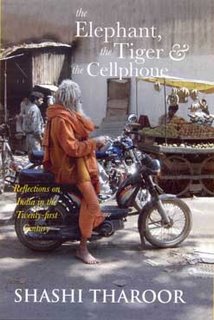The Elephant, the Tiger and the Cellphone
Sunday, February 26th, 2012India is a place that I haven’t seen enough of, and don’t know enough about. But at least I’m lucky enough to have been there twice. And let’s face it, you could spend a lifetime exploring India and not see it all – it’s a big place!
“The Elephant, the Tiger and the Cellphone” has been sitting on my bookshelf for far too long (since my last trip to India in fact), but I finally got into reading it this year, and I am really glad that I did. Shashi Tharoor is a former UN diplomat, so he knows India, having grown up and spent much of his life there, but he also has enough of an outsider’s view that he doesn’t assume too much knowledge of the country for the international reader like me.
The book is a series of fairly short and easy to read essays on all of the major subjects of Indian life – politics, religion, history, economics, and of source cricket. What is clear is that the writer has his own opinions on Indian life, and although he loves his country and is very proud of it, he is honest about the good and bad of India in the 21st century. Although this is a forward-looking book, some of my favourite parts were about Indian history – the campaign for independance and the people who led it, the pain of partition, and the politics since then. I’ve always known a little about Gandhi, but not so much about Nehru and others, and I think my next non-fiction reading might be to find out more about them.
If the book has a central message, I think it’s the great diversity of India. When I was there, I was astonished by the profusion of languages as I travelled around, and wondered how a country could stay bound together without a single common language. But perhaps that question says more about me than India; we struggle with division in Northern Ireland, even though it’s not that big and there aren’t that many of us. And Scotland isn’t much better these days…
His answer to that question is that India is at its best when it embraces the diversity that spans languages, religions, castes, ethnic types – pretty much everything. India is proud of its democracy, the massive exercise that ensures that votes are gathered from every corner of the country, and rightly so. And it’s proud of its secular society, where prime ministers, politicians, cricketers, and celebrities come from all of the different faiths.
India will be the most populous nation on earth before too long, and with its combination of science and technological leadership, and a massive diaspora of Indians all over the world, it’s a culture that we need to take notice of.
I really enjoyed this book, and it makes me want to find out more about a country that I have even greater respect for now.
